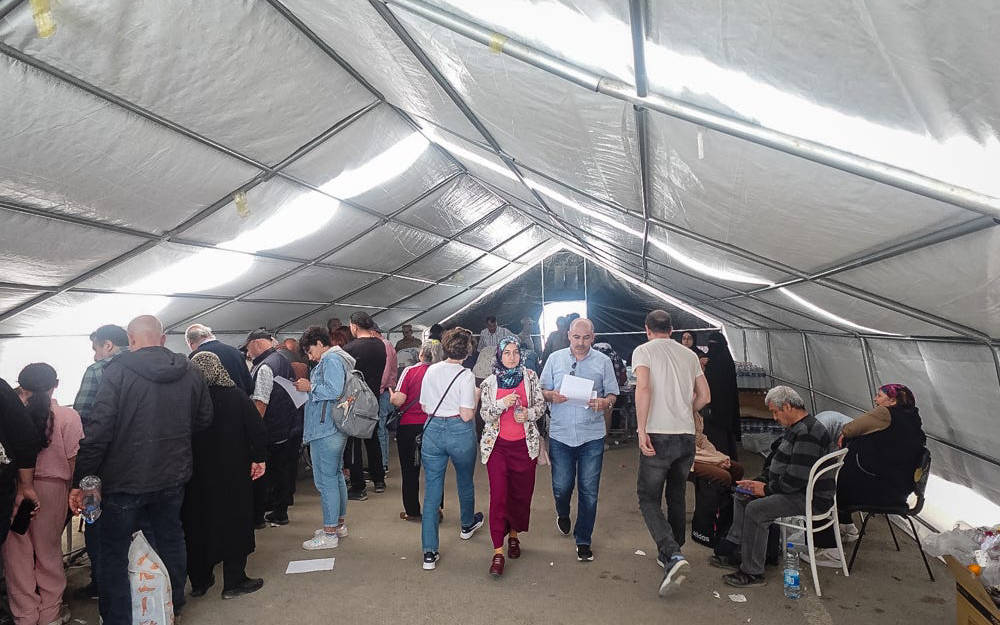Photo: AA
Click to red the article in Turkish
We are one of the most experienced peoples when it comes to inflation, so those who have the means know how to take precautions according to their income level. When it is anticipated that prices will continuously rise, the effort to dispose of the money in hand immediately begins.
If you have money, it seems best to invest in housing or land. If that's not possible, a car, regardless of whether it's new or second-hand, may suffice. If that's not possibe either, white goods or brown goods can be considered. And if none of these options are viable, one may simply settle for stocking up before prices increase.
Those who cannot afford to do any of these things do not even have the chance to console themselves in this way. Since their entire income is spent for essential expenses, they cannot change their consumption patterns and continue to consume the same things, albeit at a higher cost and in lesser quantities.
Therefore, the poorer you are, the more you will suffer from inflation. Although all income groups in the country experience the same inflation, lower income groups are more severely worn off.
Efforts to reduce food inflation
Currently, the inflation environment in Turkey is even worse. The food inflation, which primarily concerns lower income groups, is significantly higher than the general inflation rate. Food expenditures constitute the largest portion, around 25%, of average household consumption, but this rate can reach up to 40% in lower income groups.
Although nobody has trust in them, we have to use the data from the Turkish Statistical Institute (TurkStat). According to TurkStat, the general inflation rate in June 2023 was 38%, while the food inflation rate was 54%. These figures indicate that lower income groups are approximately 40% more affected by price increases compared to the overall society.
Food inflation has increased to such an extent that it has become a problem for workers to even be able to afford basic sustenance. Furthermore, according to the Food and Agriculture Organization of the United Nations (FAO), global food prices decreased by 21% during the same period, while in Turkey, they icnreaaed at record levels.
Instead of dealing with laborious methods based on knowledge while seeking solutions to these problems, the first thing that came to the minds of leaders tend to find cunning ways was to import cheap agricultural products from abroad. And they did. All products with supply problems were imported.
The solution proposed by those who opposed this approach was to increase agricultural subsidies. Indeed, state support for the agricultural sector had been steadily decreasing since the period of 1980 coup. During the AKP era, this decline accelerated even further. The share of agricultural subsidies in GDP was 0.64% in 2007, but by 2022, it had dropped to 0.33%.
The natural consequence of these policies was a shift in domestic trade terms against agriculture. The domestic trade terms, which were above 100 in the 1960s and 70s, started to decline in the 80s. Just before the AKP government came to power, it had dropped to 82 in 2001, and twenty years later, in 2021, it reached its lowest level at 39.
Turkey is now a country where the agricultural sector is shrinking both proportionally and absolutely. The cultivated agricultural areas have decreased from 28 million hectares in 1990 to 23 million hectares in 2021. Agricultural employment, which was over 6 million people a decade ago, has now decreased to 4.8 million.
Structural transformation in agriculture
It is clear that increasing agricultural support to at least 1% of GDP, which is a legal requirement, is necessary. However, it is also clear that increasing support alone will not be sufficient; a structural transformation in agriculture is necessary. Therefore, support needs to be considered alongside transformation.
The "Increasing Producer Income Share" report prepared by the Turkish Development Foundation, with broad participation, provides guiding findings and suggestions on this issue.
Evaluating these suggestions as a whole is enough to demonstrate the shortcomings in agricultural policies.
Primarily, reducing costs and increasing efficiency through the establishment of shared machinery parks, developing shared procurement and sales opportunities, accessing irrigation system technologies, renovating long-unused lands, reclaiming temporarily idle lands, investing in local certified seed production, improving storage and cold chain systems, and jointly entering marketing and retail sales chains all require cooperativization as a prerequisite.
It doesn't stop there. Achieving production planning, which is necessary to eliminate production fluctuations that occur in response to the previous year's prices, also requires cooperativization. The development of local basin-based agricultural policies is also the same.
For these reasons, agricultural support needs to be provided through cooperatives and regulated in a way that encourages cooperativization. It is considered beneficial for cooperative unions to be strong and for the strengthening unions to establish a cooperative bank, even, to ensure the effectiveness of policies.
Structural transformation means that all activities related to agriculture are conducted step by step through cooperatives. In today's conditions, it is not possible for a structure consisting of independent small-scale producers that are disconnected from each other and compete with one another to operate more extensively.
Small-scale producers will either cooperate through cooperatives or will not be able to sustain their presence in the market. Cooperatives will establish the organizational foundations to enhance social solidarity in rural areas.
A simple comparison is sufficient to demonstrate the importance and determinative role of rural cooperatives. In Turkey, the market share of cooperatives in agricultural production is around 1%. However, in the European Union, this rate is 40%. The market share of cooperatives reaches 50% in France, 55% in Italy, and 83% in the Netherlands.
Rural cooperativism is a topic that has been discussed for years but has been neglected and overlooked, and it has failed to achieve success. This approach has led to the agricultural sector in the country reaching the brink of collapse. But now, it not only threatens the rural areas but also the access to food in cities. (BD/VC/VK)





.jpg)


.jpg)
.jpg)
